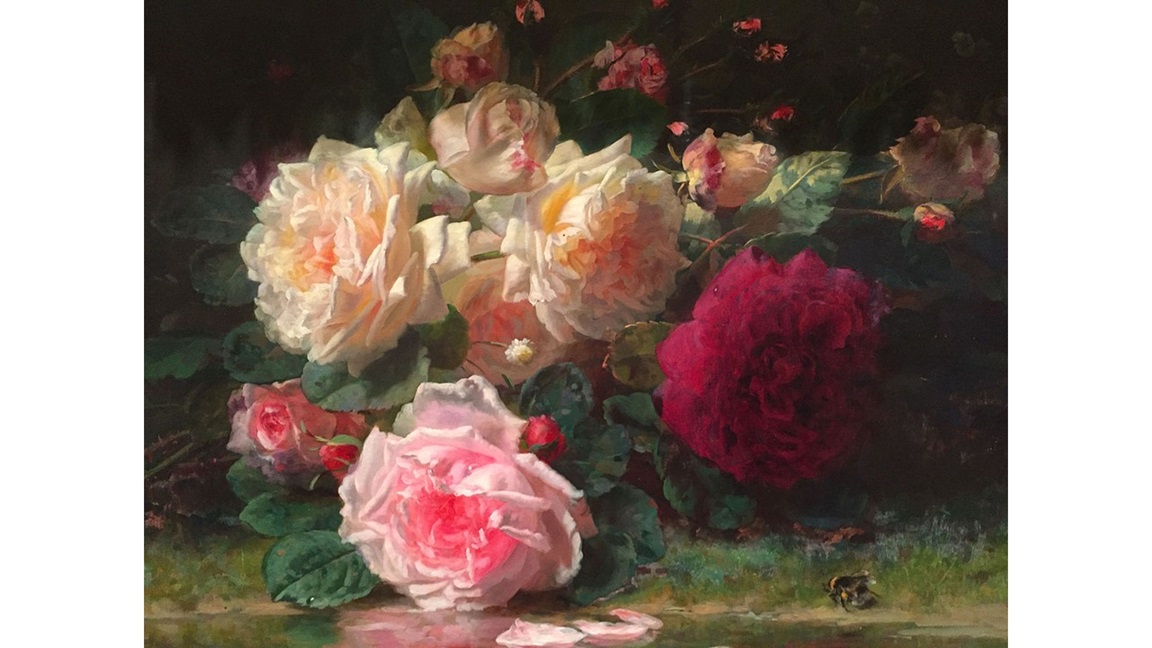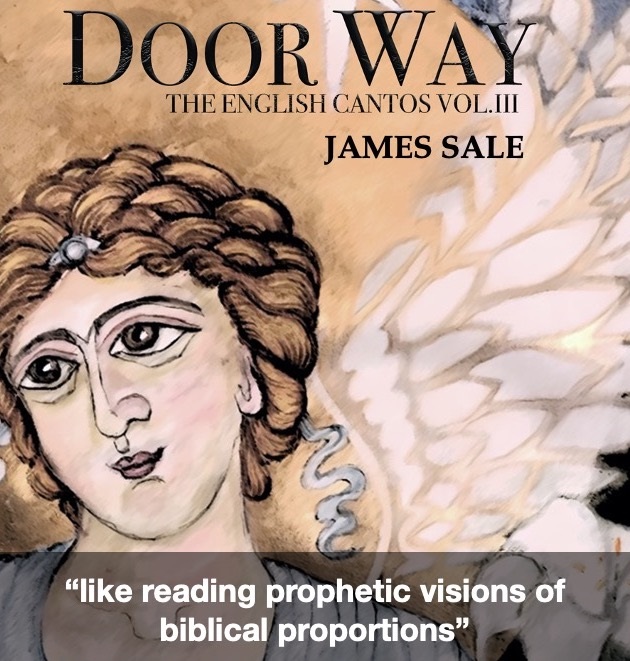.
The Pink of Gentle Hermione
and White of John Paul II
The lodger pauses, as he leaves, to gaze
At blossoms in the border at the front—
The blooms of roses, saintlike pink—appraise
Them as a Monday man might dare confront
Such sacredness, such pilgrim pink, and try
To store it up inside him as he goes
To work at hauling heavy tiles up high
To sixth floor building work. The workman knows
He needs some floral miracle to get
Him through his day. A perfect bloom
Of white will bless his aching muscle sweat
And carry him through Monday’s ruthless doom.
_The pious pink, soft petal white in eyes
__May help him slightly with his stumbling thighs.
.
.
Phillip Whidden is an American living in England who has been published in America, England, Scotland (and elsewhere) in book form, online, and in journals.

















Dear Phillip,
It is a striking contrast – the beautiful, delicate flower and hardworking, sweaty man. And yet, he appreciates the beauty and aches to take it with him. Often creation does that to me. I want to drink it in and keep the beauty with me, whatever tasks may be before me.
Gigi, your lovely comment reminds me of a favorite quote of mine. It’s by C.S. Lewis, from his marvelous book “The Weight of Glory”:
“We do not want merely to see beauty, though, God knows, that is bounty enough. We want something else which can hardly be put into words — to be united with the beauty we see, to pass into it, to receive it into ourselves, to bathe in it, to become part of it.”
Thank you Cynthia,
That is a perfect quote. I love it. I haven’t read, “The Weight of Glory,” yet but will add it to my list. I am rereading Narnia right now though. I do love Lewis!
Gigi
I love your response to Gigi Ryan, Cynthia Erlandson. It’s lovely that you made that reference to C. S. Lewis. May I (at least hopefully) expand upon the Lewis argument, please? As I understand the general view of a lot of Eastern philosophy/religion, the Eastern thinkers teach that we are not separate from any other item in the universe. If we only contemplate reality enough, we will “see” that we don’t have “to become part of it”. We already are part of it. Correct me if my reading of such philosophy is wrong–not deep enough.
Thank you very much, Gigi Ryan. Yes, you pinpointed the crucial juxtaposition and read it sensitively. I suppose that almost everyone wants beauty to lift them in the negative circumstances. Indeed, I suppose that almost everyone is at least somewhat aware of this desire for beauty. The man in the sonnet is not highly educated. I’ve never known him to be interested in any type of esthetics, but he did gaze upon these flowers. Good. Please note that I am not being condescending to him. Quite the opposite.
Phillip, your poem is brilliant. It portrays such a stunning contrast between the “Monday man” and his gruelling work, and nature’s “sacredness” which helps us all get through the difficult times in our lives, which seem, most of the time, to feel quite un-sacred. “and try / To store it up inside him as he goes” is a wonderfully profound line that describes what we try (never with complete success, it seems) to do with beauty, and how it makes us long for “an unattainable ecstasy” (another quote by C.S. Lewis, which I think of as a companion to the one above in my comment to Gigi). Thank you for this moving sonnet.
Well now, Cynthia Erlandson, I propose that the Society of Classical Poets should institute a prize for the most wonderful comments of readers on poems on this site–so that I could nominate YOURS for the award. Yours are wonderful in the way they treat my sonnets. I, like you, especially like the phrase “Monday man.” It is not (at least at first glance) part of the beauty/esthetics in the rest of the poem, but it is TRUE…and therefore {?} an an almost Eastern-Philosophy proof {?} of the unity of All. No. I am not an Eastern religion person. (I just feel I should clarify that.)
This is a wonderful poem which could speak to so many, Phillip, if only they would take its words to heart. The poet’s empathy shows most clearly in ” and carry him through Monday’s worthless gloom.”
That word “worthless” is very telling also. If only that word could be reversed by offering up the gloom, something so easily thought or said but not so easily done. I will give this poem to someone very dear to me. Thank you.
jd, I am touched that you found the sonnet so touching that you want to offer it to one you love. That will mean it will become a love poem in the usual sense which it was not orginally intended to be. However, if you read my reponses to other readers who have commented here on this sonnet, then it might make sense that intention is not crucial, since the One-ness of all things would embrace the sonnet to make it into a love poem. I believe that many humans feel their day-to-day existence is worthless–or too close to worthless for comfort. Thoreau remarks on how people might think a man lucky to inherit his parents’ farm–but then he spends the rest of his life pushing it up a metaphorical hill, or at least trying to keep it from sliding down the hill. Horrible.
A thoroughly complex poem on the theme of sacralizing time, life, and work. The need for a floral miracle of beauty to get the workman through the day is the most obvious portion, but the laborer is not only a worker. First identified as a lodger, he owns no permanent home; rather his resources only allow him to rent living space, and the garden he passes through on the way to work is not his. Yet he has the power to store it in eyes of the mind. As well, he is a builder employed in a high and large and difficult project. “Stumbling” in the last line may suggest advanced age. Or at the very least, he is one who spares no effort in his work. Considering these identities, the Monday of the poem is not a single day, but every day of profane time in a laborious lifetime. The curse of Adam among remnants of Eden come to mind.
With only implicit reference to a preceding Sunday or day of sacred time, flowers represent the sacredness that is available. The poem’s words create a closely interwoven pattern of profane labor and sacred beauty. The colors pink and white designate holiness, and no color is placed in contrast to them to represent the mundane. Instead, the world of work takes on pink and white through observation and memory of the man. In Christianity, white is the color of happiness in general, and pink is used for rare days of joy within seasons of penance. Strictly speaking, that joy within penance has the color rose.
And this poem speaks of two particular varieties of the rose flower, the pink Gentle Hermione and the white John Paul II. A feminine name with significance in myth and literature, and a masculine one from a notable figure in recent history.
The conclusion of the poem is hopeful but not especially happy. Pink and white must attempt to color “ruthless doom,” and according to the final line, these tints in his eyes may “help slightly” with the daily laborer’s stumbling thighs. All the “I” sounds imply a first-person everyman and woman.
Richly perfected, Phillip.
I am stunned at the heart by your complex and yet straight to the points reading of the sonnet, Margaret Coates. If you read my other responses to other readers comments, you will rightly think that I need to propose your comment to the judges of the contest I have proposed. I am proudly humbled that you brought out so many readings and so much depth and complexity in the poem. I think you might agree with me that the whole point of poetry is its ambiguity from which we can extrapolate many different readings. We do not need (or want) poetry that is straightforward like prose. Why bother with simple-to-read poetry? That doesn’t make sense, does it? The workman in the sonnet was my lodger. He was an Eastern European lodger in my house. His English is quite limited. And one fact about him might help me react in an unexpected way to your suggestion that Monday is non-sacral because, logically/factually it is juxtaposed with Sunday. The erswhile lodger was a Seventh-day Adventist, so to him the holy 24-hour holy period of the week is from sunset on Friday to sunset on Saturday. Sunday is not holy to him. Surely we can all agree on (if we happen to believe that some things are sacred and some other things are not) the notion that we want things that are at least in some important sense sacral–whatever language we use for that concept. I most particularly loved your last main paragraph, “The conclusion of the poem is hopeful but not especially happy. Pink and white must attempt to color “ruthless doom,” and according to the final line, these tints in his eyes may “help slightly” with the daily laborer’s stumbling thighs. All the “I” sounds imply a first-person everyman and woman.” That is amazingly close reading, Margaret Coats. You and I are in a good position because the notion and method of close reading did not really exist until about 100 years ago. Thank you for doing it with this sonnet. Yes.
Dear Phillip,
You have transformed an industrious man’s normal act of drawing inspiration, hope, strength, and zeal from flowers into a craft that speaks of some ethereal experience. If this is based on a true event and if you’re familiar with the subject of this sonnet, then please consider presenting this piece to him. I’m sure it’ll perk him up.
I like every bit of this poem, especially its phrasing and rhymes. Terms such as “Monday man” and “floral miracle” are excellent conception.
Thank you for this!
Shamik Bannerjee, thanks for paying close attention to the sonnet. I particularly love your mix of the rational with the ethereal. If you read my response to Margaret Coats’ comment, you will get helpful background about the workman who is the character in the poem. You will see that the sonnet could not have much of an effect on him because of his struggle to deal with English. I’m particularly glad that although you like “every bit of” it, two phrases in particular struck you and stayed with you. I believe it was Coleridge who said that we can’t expect a poem to be poetry from beginning to end. It is probably true that only a phrase or a line will soar into the poetry we call poetry. I’m glad that at least two phrases lifted you like that.